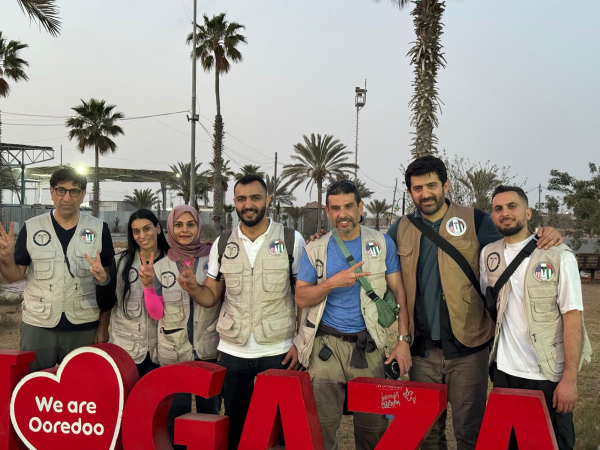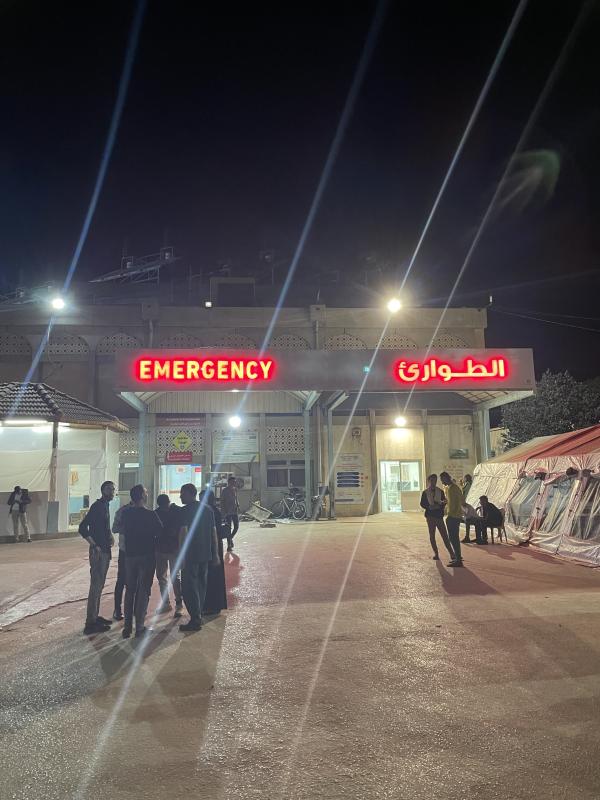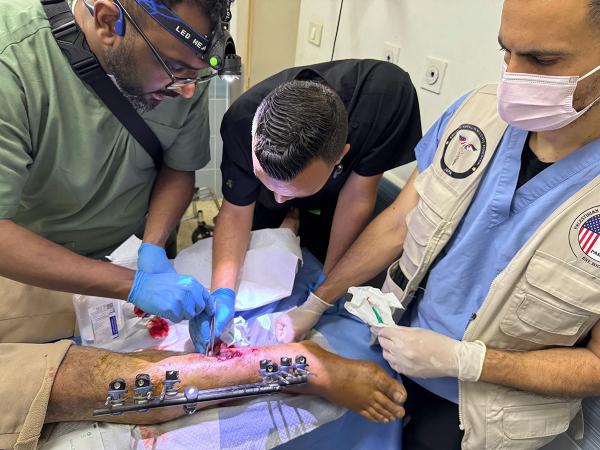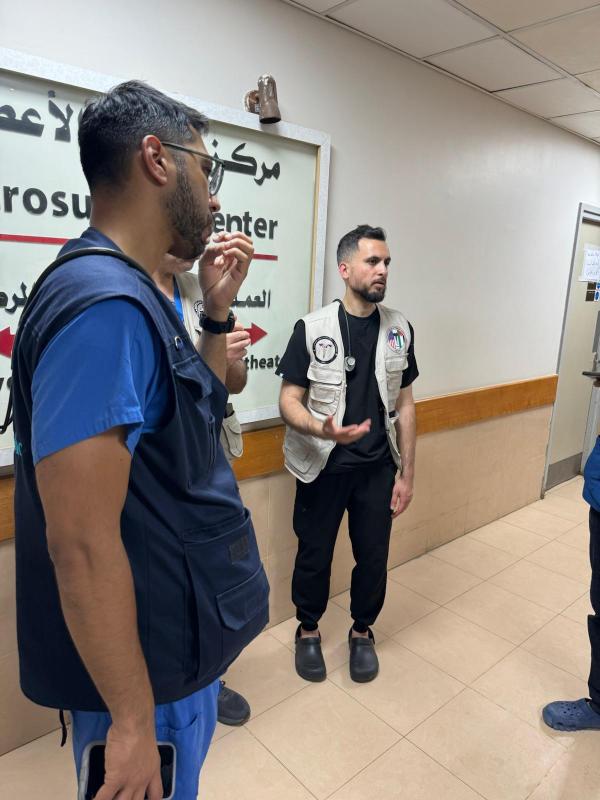The following is a transcript from an interview Alan Goodman did with Dr. Mohamad Abdelfattah, an intensive care unit (ICU) physician from Southern California and an organizer with Orange County for Justice in Palestine. Dr. Abdelfattah describes the experience of serving at the European Gaza Hospital (EGH) in Gaza for three weeks in May. The interview aired on last week’s episode 199 of The RNL—Revolution, Nothing Less!—Show on YouTube.
Alan Goodman interviews Dr Mohamad Abdelfattah on the situation in Gaza: "This is a war on children"
Alan Goodman: Thank you so much for taking time out of your extremely busy day and your important work, Dr. Abdelfattah. To describe for our audience, you were in Gaza at the European Gaza Hospital, through mid-May. Can you just paint a picture for our audience of what you experienced there?
Dr. Mohamad Abdelfattah: Absolutely, thanks for having me. We entered Gaza May 1st and it’s a very short drive from the border, the hospital. Once we crossed into Gaza we had to wait for the green light from the Israeli authorities before we could move…

International medical workers entering Gaza, May 2024, Dr. Mohamad Abdelfattah on the right Photo: Dr. Mohamad Abdelfattah
AG: You went through the Rafah crossing from Egypt into Israel, right?
Dr. Mohamad Abdelfattah: Right, so Rafah on the Egyptian side into the Gaza, the Palestinian side. So, once we crossed through the Israeli authorities have to give you a deconflicted route, which means there is a route they have approved, that they acknowledge they will not target. And this allowed us to travel from the border to the hospital. So, we waited for about 45 minutes to an hour on the bus waiting for the green light. Once we got the green light, we entered Gaza and…
AG: I want to interrupt you again, apologies for that. But just for the record, being certified as traveling on a deconflicted route, which means that there is no military activity there, has not been a 100 percent guarantee of safety for medical workers. Am I right?
Dr. Mohamad Abdelfattah: Absolutely correct. So these deconflicted routes have been used in the past for any travel of foreign doctors, foreign convoys. And this was actually used during the World Central Kitchen disaster, catastrophe. They had a deconflicted route but still were targeted. Even while we were in EGH [European Gaza Hospital]—we can get into this later—there was a UN convoy that was sent to our hospital via a deconflicted route, and they were targeted. So that was always in the back of our mind that yes, this is in coordination with Israeli authorities but that still doesn’t mean it’s 100 percent safe, and there is always a risk.
Confronting an Israeli tank while entering Gaza Photo: Dr. Mohamad Abdelfattah
So that was always in our minds. But once we did get the green light, the bus started to move into Gaza. And as soon as you enter Gaza, it’s just very evident—it was pitch black. It was in the evening time, and there was absolutely no electricity—everywhere I looked, just darkness. And what I recall is I remember seeing kids outside of their destroyed homes on their phones. So I could see their faces being lit up on their phones, and they’re sitting there in the dark on their phones. And I saw a lot of kids, a lot of family members sitting outside their homes in the dark. So that was very, very surreal just seeing how much darkness there was. I've never seen such a dark place before.
It was about a 10-15 minute drive into Gaza before we went into the EGH, European Gaza Hospital, before we arrived. We had about three buses with us full of our colleagues. We had about 19 colleagues and 250 pieces of luggage. So, we had a lot of luggage. We brought in medical supplies, sandals, books, candy for the kids, coloring books for the kids, feminine hygiene products—a variety of supplies that we know are very limited in Gaza.

Entrance to the Emergency Room, European Gaza Hospital Photo: Mohamad Adbelfattah
And as soon as you arrive in the hospital you immediately notice the hundreds of kids, thousands of kids actually. The hospital itself, they told us when we arrived there, was sheltering 30,000 people. So, 30,000 men, women and children who fled their homes multiple times throughout this war, four or five times they’ve been going to different areas that they considered safe. And so they were seeking shelter at the European Gaza Hospital. So there are kids everywhere.
As soon as we step foot outside of the bus, they attack you pretty much. They jumped, they give you hugs, they’re giving you high fives, they’re saying welcome to Gaza, smiling… just eager to get our names and learn about us. They surrounded us, they literally flocked to us. It was a really nice greeting, a warm greeting from the kids. And then we went into the dorms, and the kids actually helped unload each suitcase. So there was like a train of kids taking down each suitcase, each 250 pieces of luggage that we brought, one by one. And they were helping unload our luggage. It was an amazing sight to be honest.
And so that’s what immediately you noticed outside the hospital are these kids. They’re all very thin. They’re all malnourished, you can tell just looking at them. Their clothes, there’s holes in their clothes. You can tell that they haven’t bathed for several days, maybe even several weeks. A lot of them are barefoot, they don’t have any shoes on at all. And they’re, you know, happy-go-lucky, they’re smiling, they’re playing. You know, kids are resilient so you can’t even really tell that there’s a war going on despite, you know, hearing the bombs and the drones in the background.
So this is all before you even enter the hospital. Once we enter the hospital, you see just a chaotic scene. Again, it’s a shelter and a hospital. So every inch of the hospital you have a human being there—families seeking shelter, men, women and children in each inch of the hospital just separated by the thin white sheets that they hang up to the celling. And so, on each corridor there’s a sheet, and there’s a small area in the middle of the corridor where doctors and patients are trying to navigate through the hospital. So you’re seeing kids running in and out of the sheets. There’s a lot of noise—people talking, women are cooking. You know, there are sick people there, it’s a hospital—people are coughing, babies are crying. So it’s kind of a scene I’ve never seen before in the hospital, not something you would expect in a hospital. And so, my first day I remember I went into the ER and…
AG: Can I just ask before you move to the ER—the incredible resiliency, I mean I’m sure there’s chaos like you described, but just to maintain your humanity under those conditions is itself overwhelming.
Dr. Mohamad Abdelfattah: Absolutely the most resilient people you’ll ever meet. Again, the kids playing like nothing is happening. You know, there are people getting haircuts in the hospital compound, they’re cracking jokes, you know. Every aspect of their life is difficult: finding food, finding water, finding a clean bathroom—I mean, there are no clean bathrooms—finding a bathroom in general, just being able to charge your cell phone, just being able to find some sort of quiet place… they don’t have any of that. Every aspect of their life has been under attack. And so that, I mean immediately, was a lesson for me, how blessed we are in this country—how all these things that we take for granted, they don’t have any of them. So that was very evident. and just to see them, you know, not sitting there in sorrow and crying and complaining and in anger and just you know, like seeming very normal—that was unbelievable to me. I was like, these people have been in such horrific conditions for eight months, I couldn’t understand how they appear to be normal or functioning normal—that just shows how resilient they are.
AG: So now let’s move to the kind of experience you had. What is your specialty as a physician and what kind of work were you doing as a doctor in the hospital?
Dr. Mohamad Abdelfattah: Sure, so back here in the States I’m an ICU physician, and my role on this mission was to help out in the intensive care unit at EGH. And then I also spent time in the emergency room. And so my first day there, I wanted to go check out the ER, see what capabilities they had. And it was immediately just… I was blown away by the fact that how many people are in the ER—just overrun, patients on the floor, all patients in every bed. And so there’s a resuscitation room where the critical patients go, and I walked into that room and just immediately noticed kids. It was about a year-and-a-half-year-old kid, a boy, he was holding his arm up and just screaming, crying uncontrollably in pain. And I looked at his arm and you just see his whole forearm, the skin is peeling off—he’s got a severe burn and he’s just screaming asking for his dad. And that was difficult for me, you know, having a kid, a boy around his age. And literally right adjacent to him was another baby, about a two-month-old, sitting in her mom’s arms just crying uncontrollably. And her foot was—there was a large laceration, a large gash in her foot, and you can see the muscle layers of her foot, it was a very deep wound. This was from shrapnel and this was like a probably a four-month-old girl, crying. Like she had curls in her hair. And it was just really a devastating scene to immediately… this is the first thing I saw was kids, you know, being the victims of this war.
And that was the continued trend, to be honest with you. And you know that first day, it was overwhelming for me. I had to actually leave. I was like, you know, I’m sorry I can’t help here. There was another emergency room doctor that was with our group. He was already there, and so he was taking care of the patients, and I told him, look, I’m sorry, I have to leave.
So I went to the ICU. And in the ICU—just another scene that I’m not used to seeing, just the ICU monitor is consistently going off, the alarms beeping. Now usually in a traditional ICU when an alarm is going off on a monitor, it’s an emergency situation, it’s a disaster, people are responding. But throughout the ICU, the alarms are just continuously going off. And that’s because the monitors, the sensors themselves, are defective, so they’re not accurately picking up the right signals—so they’re constantly alarming. And the staff, they’re not taking those alarms seriously because they know they’re defective. So as soon as you walk into the ICU that’s one thing you hear are the alarming monitors.
You know, just looking at the ICU, what was very obvious was the amount of children in the ICU. So I’m an adult ICU physician, I don’t treat kids. But in the EGH intensive care unit, there’s an adult bed and right adjacent to him is a child. And so the majority of the victims in the ICU of the sick were kids of all ages, four-months-old up to 10-, 11-, 12-year-olds, on ventilators with severe burns, horrific explosive injuries where they have shrapnel all over their bodies, amputated limbs because of the severity of their injuries. The burn patients, you know, when you have burn wounds, you have to wrap these wounds in bandages and change them very frequently. However, because of the lack of staff and resources, not able to change these dressings daily, they’re becoming infected. And so a lot of the dressings of wounds are weeping, are weeping liquids, blood and yellow liquids weeping from these dressings. And what you notice is flies flying around the ICU, there are flies landing on these wounds and then traveling to the next-door patients. And so there’s no infection control in the ICU. Bacteria, very aggressive resistant bacteria are spreading throughout the ICU. They don’t have hand soap—the staff, the doctors, the nurses don’t have hand soap to wash their hands—and so there’s no way to prevent this sort of bacteria from spreading. All of the ventilators, what we noticed while we were there, are contaminated with very resistant bacteria. So when someone needs a ventilator, what you’ll notice after a few days is that you’re dealing with a really aggressive pneumonia because the ventilators are contaminated with this bacteria. So it’s a horrific scene, to be honest.

Dr. Mohamad Abdelfattah, a surgeon from California, operates on a victim of Israeli bombing at the European Gaza Hospital (EGH) in Gaza, May, 2024 Photo: Mohamad Abdelfattah
AG: I just have to establish something for our audience which is that all these incredible shortages… and just in case anyone was wondering those 150 suitcases were not your personal luggage, they were essential medical supplies you’re talking about there—but this is a man-made shortage. It’s not that the world medical community doesn’t have spare supplies that could be brought in there. It’s not even that many of those supplies are not waiting in trucks. It’s that they are being blocked from coming in, am I right?
Dr. Mohamad Abdelfattah: One hundred percent. This is an intentional man-made catastrophe, humanitarian catastrophe. One detail I forgot to mention, when you enter Rafah from Egypt you’re passing through Rafah. And what you notice are hundreds, maybe even thousands, of aid trucks just sitting there—large trucks filled with humanitarian aid, medical supplies that have been waiting for weeks to enter Gaza. And there are so many trucks, miles of trucks lined up waiting to enter.
And so that was honestly maddening for me, because I know we were allowed to bring about 10 suitcases each, and I was trying to fit everything I could in those 10 suitcases—every medical supply, every even non-medical supplies, protein bars, we were trying to bring baby formula. We were trying to bring all that we could. And you know, we were limited by the weight of each suitcase—we had 50 pounds that we could not pass for each suitcase while we were traveling with the airlines. So we filled them up to capacity. And just knowing that just right outside, a few miles outside of Gaza, are so many trucks with so much more aid that can get to the people of Gaza that is not being allowed in, that’s intentionally being blocked. It was very frustrating.
And even once I entered Gaza and started distributing the supplies that we had, we didn’t have enough, we were running out. I mean even the sandals for the kids that we brought—you give them out, and you’ll see there’ll be five more kids behind them that want sandals. And you don’t have enough, and it’s really devastating because it led to some problems amongst the kids. You know, the kids were fighting amongst each other over a pair of sandals.
And so every aspect of this war has been tough to accept. I’ve noticed this is a war on children. I’ll tell you the children are paying the brunt of this war, from the ones that are outside who have no routine. You know, there’s no school, they haven’t been in school for eight months. They’re wandering the halls of the hospital, they’re playing, they have no routine in their lives. I saw them playing at 1-2 am. You know they’re all malnourished, they’re not getting enough nutrition. And so this is all going to have consequences…
AG: I’d like to just interject on the malnutrition problem because I’ve seen reports from other doctors that people, children in particular, are not able to recover from wounds that normally, say I would go to the ER and get stitched up, and then my skin would heal, but they don’t. And also women who are trying to breastfeed babies just don’t have the caloric intake to be able to maintain a body really. I’m sure you can put it is more medical terms…
Dr. Mohamad Abdelfattah: Of course, and we noticed this in the ICU. With these patients with severe burns, they require a lot of nutrition, a lot of aggressive nutrition supplementation in the ICU. So if they were in the ICU in America, we’d be providing very aggressive nutrition through feeding tubes and just making sure that we’re hitting those numbers, those calories every single day. Whereas in Gaza, you know the hospital doesn’t provide food for these patients. The hospital doesn’t have meals to give each patient. So basically, what we had to do is encourage the families—hey, please start feeding your loved one. And they’re not able to get food—it’s tough for them to get food. There’s no way to keep up with the nutritional requirements for severe burn patients. So yes, there wounds are not healing and leading to chronic infections, chronic difficult debilities, long-term in their lives, and a lot of them succumb to their wounds. That’s what I noticed.
You know, as an ICU doctor, you want to stabilize someone that’s unstable. And so we do that in Gaza, but after 24 to 48 hours they’re dying of infection. So, for me it was very frustrating in that I didn’t see us making a big difference. Honestly, the mortality in our ICU in Gaza, probably 70 to 80 percent. So not many were surviving. You know the average mortality in American ICU is about 9-10 percent. So many of these patients that we were helping, or we thought we were helping in Gaza would eventually die of infection. And so, it was really hard on us, especially us ICU doctors, ICU doctors with other groups that were with us. And for us you know, you want to do everything that you can for these patients, you want to have a good outcome. And to not see good outcomes was tough.
AG: I just want to, maybe in closing, appreciate that, and kind of responding to what you’re saying—in addition to and perhaps even more important, I don’t know, than what you were actually able to do in treating people, is doing what you’re doing right now. Which is bringing to the world what the Palestinian people in Gaza are subjected to is. And you really see it in the hospital because this is kind of where you see everything that’s being done to people including, again, a man-made famine.
Dr. Mohamad Abdelfattah: Yeah.
AG: So that’s all part of the picture. And I really want to appreciate your courage both in going and also what you’re doing to speak out and tell people, like you are right now, what it is. And I would challenge people in this country to—this is me speaking, I’m not putting words in your mouth—but to appreciate that it is your government, the United States, that fundamentally enables all of this diplomatically, economically, and militarily. And so, everyone listening to this interview has a responsibility to find ways to act here commensurately to stop this. So I really wanted to thank you, and do you have anything you wanted to add?

Dr. Mohamad Abdelfattah with colleagues, at the European Gaza Hospital (EGH) in Gaza, May, 2024 Photo: Dr. Mohamad Abdelfattah
Dr. Mohamad Abdelfattah: I appreciate that. I mean that was eating me, honestly, alive while I was in Gaza—just that thought of being an American taxpayer, knowing that my taxpayer dollars are paying for these weapons, these munitions that are dropping on these kids. And I know that this war is, as much as it is Netanyahu’s, it’s Biden’s war. You know, he has been supplying the weapons that are continuing this war, he has been providing international cover for any sort of criticism to the Israeli conduct of this war. And so he’s allowing this war to progress and to continue—and he can end this war with one phone call. And so that’s why as Americans we need to ask these questions, like what are we gaining out of this war.
You know I have patients in Los Angeles, in a very underserved area of Los Angeles, that cannot afford their inhalers—the inhalers that I’m trying to prescribe to them to control their chronic lung disease, they can’t afford them. And so their lung disease is progressing. They’re scared to go to the ER because they’re worried about medical bills. And so we have a huge issue with our health care system here. We have student loan issues. We have housing issues, homelessness in our country. Like this money that we’re sending to Israel to bomb these children can be used here in our own country to improve the lives of our own American citizens. And so that’s why it’s a responsibility on every American to end this war. It’s an unjust war. These parents, they have no way to protect their kids.
One last story, I want to just let you know or explain is while I was in the ICU, we met a family who—they were told to evacuate a specific area in Rafah, while we were there and to go to Al Mawasi. Al Mawasi is an area along the beach where a lot of these refugees from Rafah went to live in tents on the beach. This was considered a safe zone.
So, this family left their home and went to Al Mawasi. And on this particular day it was very hot out so their child about 11-12 years old went swimming with his friends because it’s right on the beach, near Al Mawasi. And while they were swimming, they came under Israeli gunfire. And there was about five kids swimming at the time, they started panicking and swimming in different directions. And this child fell to the bottom of the ocean and ended up drowning. So, they brought him in to EGH and we saw him in the ER, he was blue. And he passed. He had sand in his fingers, you can see.
And it just goes to show you that there’s no safe area in Gaza, not one area is safe. And they told me this over and over again, that they don’t trust the Israeli authorities when they tell them to move to different areas. But they want to try, you know, they hope that this is a safe zone, and it ends up not being a safe reality for them. And so, there’s no safe area in Gaza, these parents can’t even protect their children. The most basic right of a parent is you want to protect your child, and they can’t do that.
And so it’s an unjust war, and I would just plead to everyone listening to do your part in helping to end this war.
AG: Well, thank you for that. And yeah, and we should take that as a challenge. So thanks again for your time, really appreciate your courage in going and also I know you’re working hard to share what you learned and what you experienced there, and we should all take inspiration from that. So, thanks again for your time.
Dr. Mohamad Abdelfattah: I appreciate your time as well, thanks for having me.